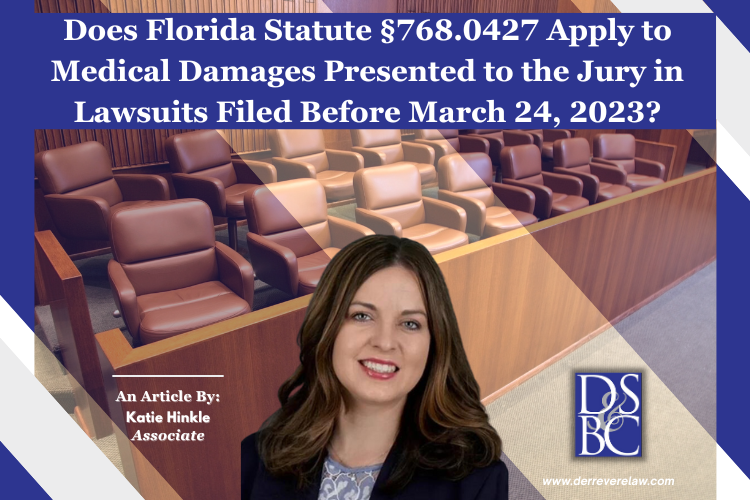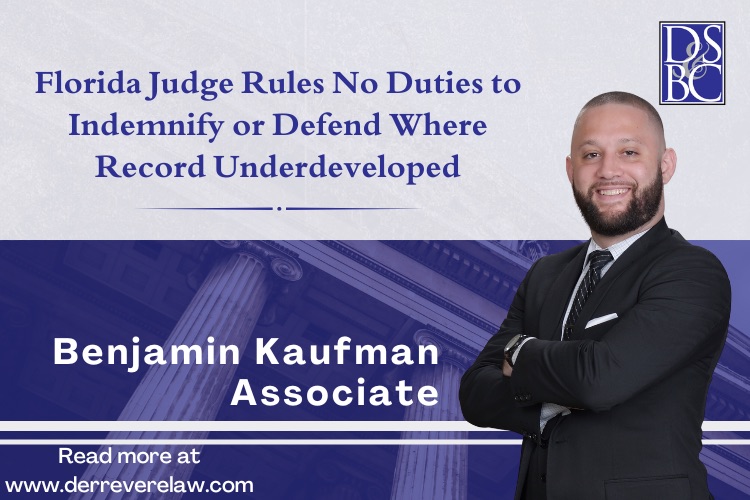Does Fla. Stat. 768.0427 Apply to Medical Damages Presented to the Jury in Lawsuits Filed Before March 24, 2023?

On March 24, 2023, Florida House Bill 837/Senate Bill 238, which arguably proposed the biggest tort reform in civil litigation since 1989, was signed into law by Florida’s Governor DeSantis. The bill became effective on the date the Governor signed it into law, creating Florida Statute 768.0427.
One of the major implications of this newly enacted statute was the calculation of medical damages to be presented to a jury in a personal injury or wrongful death case. The intended purpose of Fla. Stat. 786.0427 was to “provide uniform standards to assist juries in calculating the accurate value of medical damages in personal injury or wrongful death actions.”1 However, for attorneys with Trial Orders quickly approaching in the next couple of months, is there a possibility that Fla. Stat. 768.0427 would apply immediately to the presentation of damages, even for cases that have been in litigation prior to March 24, 2023?
To determine the answer to this question, we must first evaluate the change in the law to determine whether it is a substantive, or procedural/remedial change in the law.2 While substantive law does not apply retroactively absent a clear intention for it to do so by the legislature, procedural law would apply retroactively. A “remedial statute” relates to modes of “procedure,” and these statutes do not create or take away a right, but instead further a remedy or confirm pre-existing rights.3 These statutes are applied to pending cases to further the intent of the legislature.4 This is in contrast to a substantive change in the law.
Florida Statute 768.0427 subsections (2) and (3) provide as follows:
|
Health Insurance Benefits |
No Health Insurance Benefits |
Medicare/Medicaid |
|
|
Satisfied Past Medical Expenses |
|
|
|
|
Unsatisfied Past Medical Expenses |
|
|
|
|
Future Medical Expenses |
|
|
|
Fla. Stat. 768.0427 does not require a Claimant to utilize his or her health insurance benefits when seeking treatment. However, in the event the Claimant chooses to pursue treatment through a Letter of Protection or does not submit their bills to their applicable insurance carrier or Medicare/Medicaid, the same guidelines for the presentation of medical evidence listed in the above chart would apply. Furthermore, if the Claimant utilizes a Letter of Protection and the health care provider has transferred the right to payment to a third party, evidence of the amount the third party paid or agreed to pay the healthcare provider in exchange for the right to receive payment will be presented.
To further the effect of this statute on the presentation of evidence in a personal injury or wrongful death case, Fla. Stat. 768.0427(3) requires that the Letter of Protection, itemized billing with applicable coding, claimant’s health care coverage, and identity of the person who made the referral must be disclosed as a condition precedent to any claims for medical treatment rendered pursuant to a letter of protection. The identity of the person making the referral is specifically not protected by the lawyer-client privilege enumerated in Fla. Stat. 90.502.
While at first look it may appear that the entirety of this Statute would apply to lawsuits filed after the effective date of March 24, 2023, upon a more in-depth review there is a potential that Fla. Stat. 768.0742 (2) and (3) are procedural or remedial in nature, and therefore would apply to existing lawsuits. It is well settled that the admission of evidence is procedural in nature, and therefore is applied retroactively without violating the prohibition against ex post facto laws.5
An example of this occurring in the past would be Florida’s major overhaul in the standard for admissibility of expert testimony, changing from the Frye standard to the federally adopted Daubert standard. In Larocca v. State of Florida, the Defendant had appealed a conviction of first-degree murder.6 While Frye was the standard as to admissibility of expert testimony at the time of the trial, the Florida Supreme Court had adopted the Daubert standard during the pendency of the appeal.7 The Fourth District Court of Appeal applied the Daubert standard to the facts of the case, specifically stating that the amendment implementing Daubert was procedural in nature, and therefore applies retroactively, regardless of whether or not Frye was the standard at the time of the Defendant’s trial.8
It has been argued that the portions of Fla. Stat. 768.0427 that discuss admissibility of medical evidence relate only to the procedural aspect of what specific testimony and/or documentation can be presented to a jury at trial regarding medical damages. Most recently, on June 14, 2023, in Hollingsworth v. Mutz, the Honorable Nancy Jacobs in Hillsborough County executed an order Granting the Defendant’s Motion to Continue Trial on the basis of this exact issue.9 Despite the accident subject to the lawsuit occurring on October 20, 2020, the Defendant moved for a continuance to complete discovery as to the Plaintiff’s health insurance company and the relationship between the Plaintiff’s treating physicians and her attorney based upon the newly enacted statute. The Court granted the Defendant’s Motion in an Order containing a detailed analysis of her ruling that Fla. Stat. 768.0427 was procedural in nature, and therefore the Defendant was entitled to complete the remaining discovery of the items enumerated within the newly created statute.
Due to the magnitude of importance as to whether Florida Statute 768.0427 is applicable to all medical damages presented to a jury in personal injury and wrongful death actions pending throughout the state, it is likely there will be continued litigation regarding what evidence may or may not be admissible at trial. However, regardless of whether you are representing the Plaintiff or Defendant, it is an important issue to consider when preparing for any upcoming personal injury or wrongful death trial.
1 Florida Staff Analysis, H.B. 837, 2/17/2023.
2 Smiley v. State, 996 So.2d 330, 334 (Fla. 2007).
3 Id.
4 Id.
5 Windom v. State, 656 So.2d 432, 439 (Fla. 1995)
6 Larocca v. State of Florida, 289 So. 3d 492, 493 (Fla. 3d DCA 2020)
7 Id.
8 Id.
9 Hollingsworth v. Muntz, Case No. 21-CA-07113



